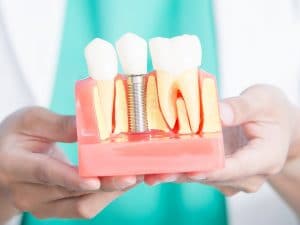 When your smile loses one or more teeth, it loses several different aspects that contribute to its overall function. The most obvious of these aspects is your ability to bite and chew your food comfortably, which can be affected by the imbalance caused by the empty space in your teeth’s ranks. Other, much less obvious aspects include the ability of your healthy, natural teeth to absorb all of your bite’s pressure, and to translate that pressure into stimulation for the jawbone structure that supports them. Fortunately, many patients can restore these and most other aspects of their oral health and bite function with the help of dental implants.
When your smile loses one or more teeth, it loses several different aspects that contribute to its overall function. The most obvious of these aspects is your ability to bite and chew your food comfortably, which can be affected by the imbalance caused by the empty space in your teeth’s ranks. Other, much less obvious aspects include the ability of your healthy, natural teeth to absorb all of your bite’s pressure, and to translate that pressure into stimulation for the jawbone structure that supports them. Fortunately, many patients can restore these and most other aspects of their oral health and bite function with the help of dental implants.
Treatment to control gum disease
While there are many different reasons why people experience tooth loss, gum disease is the most frequent condition that leads to it. The way gum disease leads to tooth loss is by eroding the gum tissues and jawbone structure that support them and their roots. This process doesn’t stop once a tooth is lost to the disease, but will continue increasing your risks of losing more teeth the longer it’s left untreated. Before replacing your lost teeth, and especially if your tooth replacement consists of dental implants, it will be important to seek treatment to get your gum disease under control first.
Grafting to strengthen their jawbone
Whether it’s from the erosion caused by extensive gum disease, the loss of stimulation resulting from a missing tooth root, or a combination of both, many patients who’ve lost teeth have also lost some of the mass and density in their jawbones. This loss can impact your immediate and long-term oral health in several different ways, including causing you to experience heightened risks of further tooth loss. A weakened jawbone can also impact your candidacy for dental implant placement, which requires adequate jawbone structure to support the root-like posts. With jawbone grafting, you may be able to strengthen your jawbone structure to provide better support for your implant restoration.
Extraction to remove a compromised tooth
Dental implants are typically designed to replace teeth that are already lost, but if you have a severely compromised tooth that can’t be saved, then extracting it could be preferable. The loss of the tooth structure can still impact your oral health, however, and replacing the tooth with a dental implant could be the most important next step in preserving your smile.
Find out if you qualify for dental implants
Dental implants can be an excellent way to restore and preserve your smile, but you may need to address one or more issues before you receive them. To learn more, schedule an appointment with us by calling Dreem Dentistry in Leawood, KS, today at 913-681-5500. We also serve patients who live in Overland Park and all surrounding communities.






